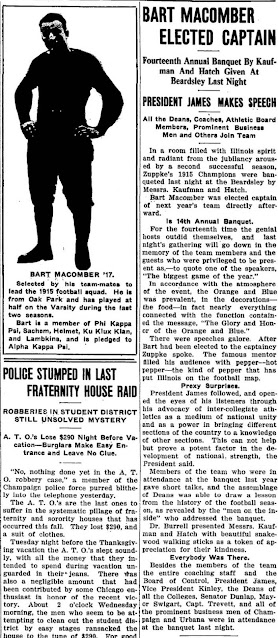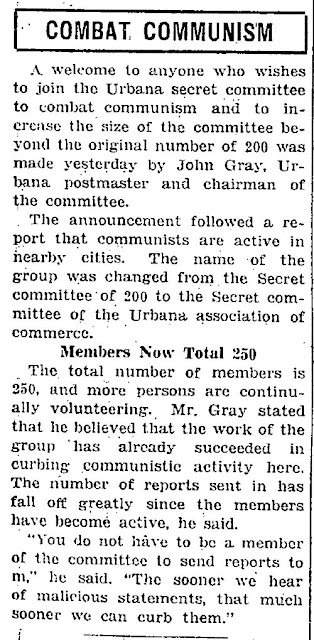The Ku Klux Klan organization on campus likely predates the second national organization started in 1915 by William Joseph Simmons, perhaps by several years. The University has a Frequently Asked Questions page on their website that covers some of the basics here. Local news coverage from WAND when one of the year book photos of the college organization received attention a couple years ago here. From the University's FAQ:
The first apparent Ku Klux Klan references in the University of Illinois yearbook occurred in The Illio 1909, with "Ku Klux" being listed as student activity/organization for several senior (class of 1908) students; the 1909 yearbook, however, did not include a group photo page or a statement of its purpose.[2] From early on, a defining characteristic of the group seemed to have been a penchant for extreme secrecy.
The archive of Illio yearbooks is available from the University here. The FAQ also notes that group became more official and started appearing in the yearbooks earlier in the year of 1915:
On January 27, 1915, the Council of Administration approved a petition (submitted by Harold Pogue) to "perfect" the organization of the group. According to the minutes of the Council, membership in the group was limited to "one junior representative from each of the national fraternities at the University of Illinois."[4] The campus Klan was listed in subsequent yearbooks until 1925, by which point its name had been changed to Tu–Mas.
The various 1906 to 1909 claims of establishment may put the campus Klan's formation after the publication of the book that later inspired the film "Birth of a Nation," titled "The Clansman" (publish in 1905). The more public and official status as a campus organization began earlier in the year than the national organization's formation. As noted in a previous post, the timing may be more coincidental as northern history books and local newspapers suggested there was already widespread sympathy with the goals of the original Klan. A future post on revisionist history of Reconstruction that led to this, including local contributions, is forthcoming.
With the more official status came more coverage in the Daily Illini. It is more of what you'd expect from a fraternal organization, with informal dance announcements and various group membership lists. The group played a role in organizing campus events. In at least one known example they provided an unofficial enforcement role. From the 11/1/1919 Daily Illini:
Other members were mentioned as Illio yearbook editors or Football captains. Examples from the 5/6/1921 and 11/30/1915 Daily Illini:
The University of Illinois Ku Klux Klan became embroiled in controversy at this same time. According to the Daily Illini, "on the evening of a recent Ku Klux Klan . . . dance, the hooded and gowned members of the organization overstepped the bounds of propriety at a number of organized houses." The student newspaper elaborated on the incident, reporting that the campus Ku Klux Klan members had "disguised themselves in the red-crossed robes and hoods and loudly proclaimed their presence." Maintaining that the incident was prompted by "simple idiocy," the Daily Illini editorialist called on the university group to change its name in order to distinguish it from the national Ku Klux Klan:The campus group is in no way connected with the older group that is now spreading so rapidly throughout the country; its aims and its ideals are of a different nature, its personnel different; the campus Ku Klux Klan is purely a social organization.The Daily Illini deemed it "unfortunate that the juniors should have the same name as the band of 100 percent Americans who have aroused such a storm of protest from coast to coast."
I haven't been able to find any information on the meaning of "Tu-mas" either real or, as was often the case at the time, simply made up. Leading up to this March decision, the local chapter of the national Klan ("Zenith Klan No. 56" as it was known) had made its presence impossible to ignore. From the 1/31/1923 News-Gazette and Urbana Daily Courier respectively:
As usual, the mainstream message of the Klan often argued that they held no racial or religious enmity, in spite of all the evidence to the contrary. It's often argued that "everyone was racist back then" or that "nobody knew any better," but many of the arguments and mainstream marketing approaches mirror groups today that also preach overt white nationalism in their closed groups.
In the days before the local campus decided to implement the name change (agreed upon the month before), the local chapter of the national Klan put on a massive 40 foot tall burning cross display in southwest Champaign:
Prior to this, most of the Daily Illini articles on the activities of the campus Klan involved informal dances and recent pledges. From the 1/15/1921 and 4/22/1920 Daily Illini:
andA separate page of newspaper clippings and other resources on the campus Klan organization will be made available soon. There will also be some Klan financial records posted that will allow people to cross reference members of the campus organization and those who were listed in the local chapter of the national organization.





















No comments:
Post a Comment